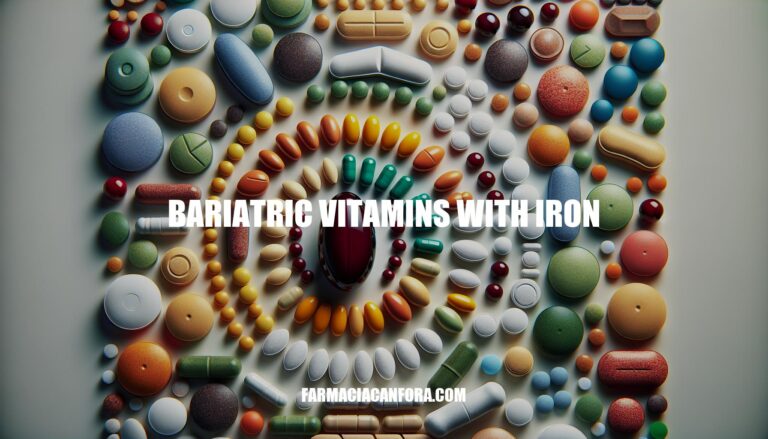


Bariatric surgery significantly alters the digestive system, impacting nutrient absorption. For individuals who have undergone this procedure, bariatric vitamins with iron are crucial. These specialized vitamins help prevent deficiencies in essential nutrients like iron, which is vital for producing hemoglobin and preventing anemia. By ensuring adequate intake of these vitamins, patients can maintain overall health and avoid complications associated with nutrient deficiencies.
Taking bariatric vitamins with iron offers several specific benefits:
Improved Energy Levels: Iron is essential for the production of hemoglobin, which carries oxygen in the blood. Adequate iron levels help prevent fatigue and boost overall energy.
Better Immune Function: Iron plays a crucial role in maintaining a healthy immune system. It supports the growth and differentiation of immune cells, enhancing the body’s ability to fight infections.
Prevention of Anemia: After bariatric surgery, the reduced absorption of nutrients can lead to iron deficiency anemia. Supplementing with iron helps prevent this condition, ensuring that red blood cells can carry sufficient oxygen throughout the body.
Crucial for Post-Surgery Recovery: Iron is vital for healing and recovery post-surgery. It supports the production of new cells and tissues, aiding in the overall recovery process.
These benefits make bariatric vitamins with iron an essential part of post-surgery care, helping patients maintain their health and well-being.
Here are the detailed guidelines for the recommended dosage and usage of bariatric vitamins with iron:
Form:
Timing:
Additional Tips:
By following these guidelines, you can ensure that you are getting the necessary nutrients to support your health after bariatric surgery. If you have any specific concerns or conditions, it’s always best to consult with your healthcare provider or dietitian.
Potential Side Effects:
Tips to Mitigate Side Effects:
When to Consult a Healthcare Provider:
When choosing bariatric vitamins with iron, consider these key factors:
Ingredient Quality: Look for vitamins that meet the American Society for Metabolic and Bariatric Surgery (ASMBS) guidelines. Ensure they contain essential nutrients like Vitamin A, D, E, K, B12, folate, and iron. Opt for high-quality forms of these nutrients, such as carbonyl iron, which is gentler on the stomach compared to ferrous iron.
Brand Reputation: Choose reputable brands known for their quality and adherence to ASMBS guidelines. Brands like BariLife and ProCare Health are well-regarded in the bariatric community. Check for third-party testing and reviews to ensure product reliability.
Specific Needs Based on Surgery Type:
Choosing the right bariatric vitamin with iron involves balancing these factors to meet your specific post-surgery nutritional needs. Always consult with your healthcare provider to tailor the choice to your individual health requirements.
Bariatric surgery significantly alters the digestive system, impacting nutrient absorption. To prevent deficiencies, individuals who have undergone this procedure require specialized vitamins with iron.
These supplements help maintain overall health and avoid complications associated with nutrient deficiencies. Key benefits of bariatric vitamins with iron include improved energy levels, better immune function, prevention of anemia, and crucial support for post-surgery recovery.
The recommended dosage varies depending on individual needs, but generally includes 36-60 mg of iron per day, along with other essential nutrients like vitamin B12, folic acid, thiamin, zinc, and copper.
It is also important to follow usage guidelines, such as taking chewable or liquid vitamins for the first few months post-surgery and separating iron from calcium supplements.
Potential side effects include nausea, constipation, diarrhea, upset stomach, and black stools, but these can be mitigated by following tips like taking with food, staying hydrated, increasing fiber intake, and switching to carbonyl iron.
When choosing bariatric vitamins with iron, consider factors such as ingredient quality, brand reputation, and specific needs based on surgery type. Ultimately, consulting a healthcare provider is crucial for personalized advice and ensuring the right supplements are taken to maintain optimal health after bariatric surgery.